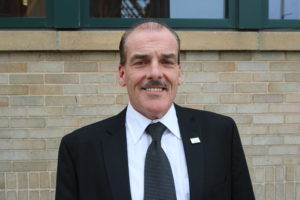George, age 52, was born in Springfield,
Massachusetts, and raised in Atlantic City,
New Jersey. “Growing up, my father was never
around, so my mother raised me and my five
siblings,” recalls George. “My childhood was
rough. I got my first job at age 13, working at
a car wash. We all worked to help support my
mom and maintain our house. The six of us
kids worked so much that we all dropped out
of high school. I dropped out of school when
I was 15, even though I was an ‘A’ student. I
did not drink alcohol or use drugs growing up
because I was responsible and had to make
sure our bills were paid.”
“When I was 32, I realized how important
education was and enrolled in school for
Network Security. My life was going well, but
by 35, I started drinking heavily. And by 45, I
began to hit my ‘rock bottom.’ I was working
in Atlantic City in the construction industry. I
would work hard all day and drink all night.
Soon, I would have a beer for breakfast and
drink throughout the day. I was a functioning
alcoholic. I never lost a job because of my
drinking, but I started losing memories,
stopped eating, and began isolating myself
from my family and friends. At the time, I
did not accept my addiction even though
everyone kept telling me that I had a problem
with alcohol.”
“By 2021, things went from bad to worse. I
was drinking all day. I always hung out at and
attended Our Lady Star of the Sea Church in
Atlantic City. The nuns at the church were
trying to help and guide me. A guy named
Jorge, who I used to drink with, was grabbed
by Pastor Victor and taken to Helping Up
Mission (HUM) in Baltimore. Six months later,
Pastor Victor grabbed me and drove me to
Baltimore, where I entered HUM’s Spiritual
Recovery Program.”
“When I came through HUM’s doors, I was
scared and did not know what I was getting
myself into. They took me to Mercy Hospital
for detox, and when I returned, I spent the
next 30 days in the intake dorm. It was rough.
I could not walk because of the ‘shakes,’ I lost
a lot of memory, had a tough time eating, and
went through a period of ‘night sweats’.”
“I am a visual learner. I started to see HUM’s
potential – this is God’s House. I began
focusing on myself, praying, and learning
about HUM. Knowing where I came from,
I never thought I would become an intern,
staffing the 24-hour intake hotline. I am
giving back by talking to people needing
God’s Help. I tell prospective clients to
come in, I will be waiting for them, and I
will get them into treatment somewhere.”
“When I first came to HUM, we had a small
Hispanic community of around 10 men.
Today, we have over 40 Hispanic men in
the Spiritual Recovery Program. We offer
Spiritual Bible study, mental health classes,
a Hispanic choir, guitar lessons, Hispanic
AA (Alcoholics Anonymous) recovery
meetings, and 12-step classes. They can
take ESL classes and get their high school
diploma in our Learning Center. Our
Hispanic community is thriving, and we
look forward to helping more Hispanics in
the community!”
“I am honored to get the chance to be
a part of the support team that provides
outreach to the community. We get off
the bus and see people looking for help
while under the influence. They look like
I used to look! Along with drinks, snacks,
hygiene kits, socks, and hats, we provide
the homeless community – with prayers.
Whether we visit Dundalk, Fells Point, or
Brooklyn Park, we provide relief and human
touch. And if we bring one person back
with us, it is a miracle! One less person on
the streets.”
“I want to continue helping people
experiencing homelessness and addiction.
With the help of God, I want to do this for
the rest of my life. I am blessed that Pastor
Victor grabbed me from Atlantic City and
showed me a better life is available. Thanks
to Helping Up Mission, I own a wristwatch
for the first time and am getting my driver’s
license. I am regaining my strength and my
spiritual life back. I am so close to God.”
“To the donors, you are a blessing.
Knowing there are people like you who
will bless a stranger with clothes, food, and
everything they need, put me in a position
to be hired as HUM’s Intake Program
Coordinator. I am happy that I found a
new life and a new beginning. I thank God,
HUM, my friends at HUM, and you for
blessing my life.”
